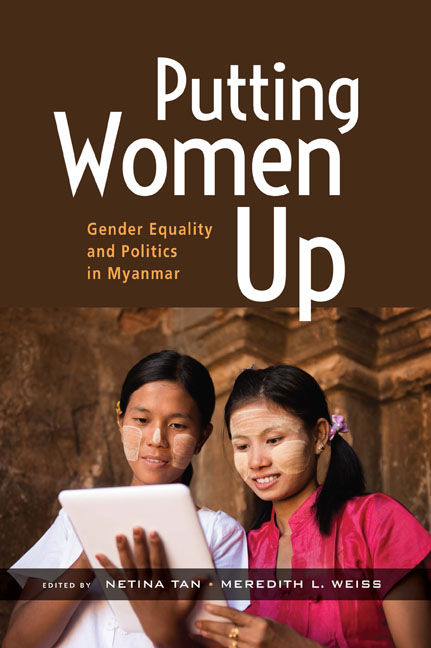Book contents
- Frontmatter
- Contents
- List of Tables
- List of Figures
- Acronyms and Glossary
- Acknowledgements
- About the Contributors
- 1 Putting Women Up: Promoting Gender Equality in Myanmar Politics
- 2 The Secret Garden of Candidate Selection and Women’s Political Participation
- 3 Ethnic Parties, Representation, and Female Candidate Recruitment in Myanmar
- 4 Attitudes Towards Women and Political Leadership
- 5 Violence, Gender, and Politics
- 6 Navigating Local Politics and Gender
- Appendix One Background of Selected Political Parties and Vote Shares
- Appendix Two Survey Questions
- Appendix Three Focus Group Guide for Field Data Collection
- Appendix Four Interview Guide Used for Field Data Collection
- Appendix Five Samples of Elite Interview Questions
- Index
6 - Navigating Local Politics and Gender
Published online by Cambridge University Press: 18 April 2024
- Frontmatter
- Contents
- List of Tables
- List of Figures
- Acronyms and Glossary
- Acknowledgements
- About the Contributors
- 1 Putting Women Up: Promoting Gender Equality in Myanmar Politics
- 2 The Secret Garden of Candidate Selection and Women’s Political Participation
- 3 Ethnic Parties, Representation, and Female Candidate Recruitment in Myanmar
- 4 Attitudes Towards Women and Political Leadership
- 5 Violence, Gender, and Politics
- 6 Navigating Local Politics and Gender
- Appendix One Background of Selected Political Parties and Vote Shares
- Appendix Two Survey Questions
- Appendix Three Focus Group Guide for Field Data Collection
- Appendix Four Interview Guide Used for Field Data Collection
- Appendix Five Samples of Elite Interview Questions
- Index
Summary
Conventional assumptions about women's representation posit that higher proportions of women will be found at local levels of government where barriers to entry are minimal than at higher levels (Mariani 2008; Eder, Fortin-Rittberger, and Kroeber 2016). Indeed, studies on established democracies have found that the number of women in politics decreases when one moves from local to national governments (Vengroff, Nyiri, and Fugiero 2003; Kjaer 2010). This literature has shown that lower-level offices tend to be more open and accessible to women (Brodie 1985; Lovenduski and Norris 1993; Vengroff, Nyiri, and Fugiero 2003). However, evidence of this trend is inconclusive in less established or newer democracies, where limited formal institutions and lack of political party activity might prevent women from entering local politics (Kyed, Harrisson, and McCarthy 2016; Aydogan, Marschall, and Shalaby 2016).
Existing literature on Myanmar highlights structural, cultural, and institutional barriers to women's political participation at all levels of government (Löfving 2011; Latt et al. 2017). Yet, the discrepancy between the percentage of women represented at the local level and at the national and state/region level in Myanmar in the late 2010s challenges the “pyramid” model of women's representation: that women will be better represented closer to the ground. Following the 2015 general election (GE), women made up approximately 13.7 per cent of all elected members of parliament (MPs) in the Union (national) parliament and approximately 12.7 per cent of all MPs in the state/region parliaments across the country (excluding military seats). Meanwhile, women represented less than 1 per cent of elected ward/village tract administrators at the local level across the country. Why was women's representation so low at the local level in Myanmar? Drawing on extensive qualitative evidence from local interviews and focus-group discussions (see Chapter One for details), along with secondary data on local elections and politics, we investigate how women participated in local politics and why so few female local leaders were elected in Myanmar prior to the February 2021 military coup.
Following the coup, the military suspended national and state/ region parliaments. The military has tried to maintain existing local governance arrangements, as stipulated in the 2008 Constitution. However, the democratic opposition rejects that constitution. In most of the country, the junta-controlled local administration has either completely broken down or is severely weak.
The Myanmar people's revolution against the military resulted not only major political change, but also considerable economic, social, and cultural change.
- Type
- Chapter
- Information
- Putting Women UpGender Equality and Politics in Myanmar, pp. 143 - 166Publisher: ISEAS–Yusof Ishak InstitutePrint publication year: 2024

